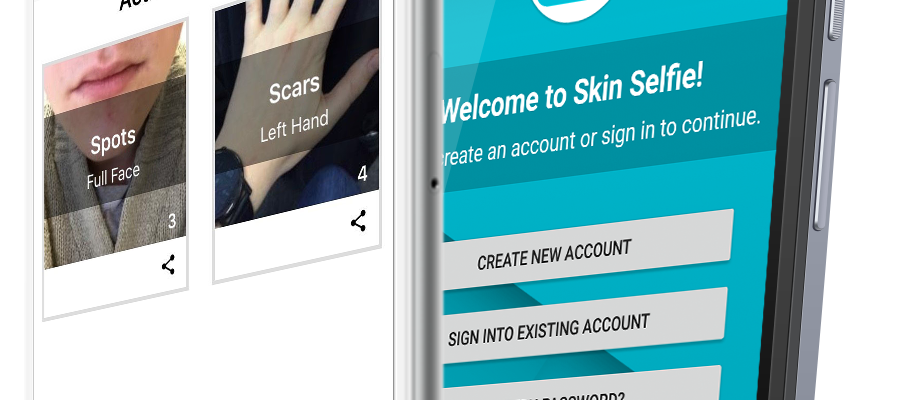Consultants at Newcastle’s Royal Victoria Infirmary have developed the app ‘MySkinSelfie’ to help patients monitor and share images of skin conditions.
Developed in partnership with Newcastle University Computing Science and Newcastle Hospital’s Dermatology department, MySkinSelfie allows patients to capture, store and share images with consultants and GPs for review and monitoring.
One of the most popular uses for the app is to assess patients for possible skin cancers, allowing easy review and quick treatment without having to attend for a face-to-face clinic appointment.
As dermatology consultant at Newcastle Hospitals and founder of My Skin Selfie Dr Philip Hampton explains: “We have been using My Skin Selfie successfully in our basal cell skin cancer clinic, to assess new or changing skin lesions and to book patients directly for surgery when needed.
“Another popular use for MySkinSelfie is mole monitoring. The incidence of skin cancer is increasing and early treatment is most effective. Most patients who attend the melanoma assessment clinic have got benign lesions that do not need removal.”
An easy to use overlay function in the app allows the first image to be a template for further images, so that perfectly aligned sequences of photos can be taken. This improves the accurate monitoring of skin lesions, such as monitoring moles.
As Dr Hampton explains: “Once a skin lesion has been given the all clear, MySkinSelfie is the perfect tool for self-monitoring to check for future changes in appearance, which could be an early sign of skin cancer and should trigger re-assessment.”
“Remote assessment is enabling many patients to be booked directly for biopsy or surgery, which is reducing their number of visits to the hospital. This has been really important in our response to COVID-19.”
Seventy-three-year-old John Nott from Prudhoe, Tyne Valley, was able to use the app with the help of his daughter, to get a skin issue checked out he said:
“The best thing was that I was able to sit in my own living room, get a photograph taken of the area and it was done. I didn’t have to go into Newcastle for someone to take a look at it.
“A couple of weeks after sharing the photos with the doctor, I was called to say that I would need a procedure. It was reassuring to get it looked at quickly, and that I would receive treatment faster than if I had waited for an appointment.
“People of my age, and If I didn’t have transport, would have had to walk half a mile to get a bus into Newcastle, and repeat on the same back for the problem to be looked at. It’s a brilliant idea.”
Sixty-three-year-old Carole from Wallsend used the app to log two different areas of skin that were a concern. She was able to get help quickly rather than waiting for an appointment in clinic at the hospital, she said:
“I set myself up using the app, and I was able to start logging photos for the doctor to look at. I was able to speak to the doctor shortly after sharing them, and it was really reassuring.”
Following the assessment of the photos, it was decided that Carole would need an appointment in clinic as a priority:
As Carole adds: “If I hadn’t had this option, I might not have bothered getting it looked at, as I didn’t want to waste their time.
“It can be very worrying, so being able to use this app is something I would definitely use again. They have said that I can continue to use it to track my skin lesions.”
The app was recently added to the NHSX digital playbook, to help support clinical teams and organisations that are looking for digital tools that support the delivery of patient pathways.
All images are automatically dated, encrypted and securely stored in the cloud. The user is able to create separate folders for each skin problem. Users can add images without an internet connection to upload later. The app and web based image viewing platform are fully compliant with NHS England information governance and digital standards.
The images you take are stored by the university in the cloud over a secure connection and, with the patient’s consent, subsequently shared with Newcastle Hospitals.
This means you can access them across multiple devices for years to come – perfect for long-term condition tracking.
The App is being used by NHS Dermatology clinics in Newcastle and Bristol to assess patients with possible skin cancer and to also to assess psoriasis and acne. Other clinics wishing to use the MySkinSelfie platform can contact Newcastle Hospitals Dermatology Department.
